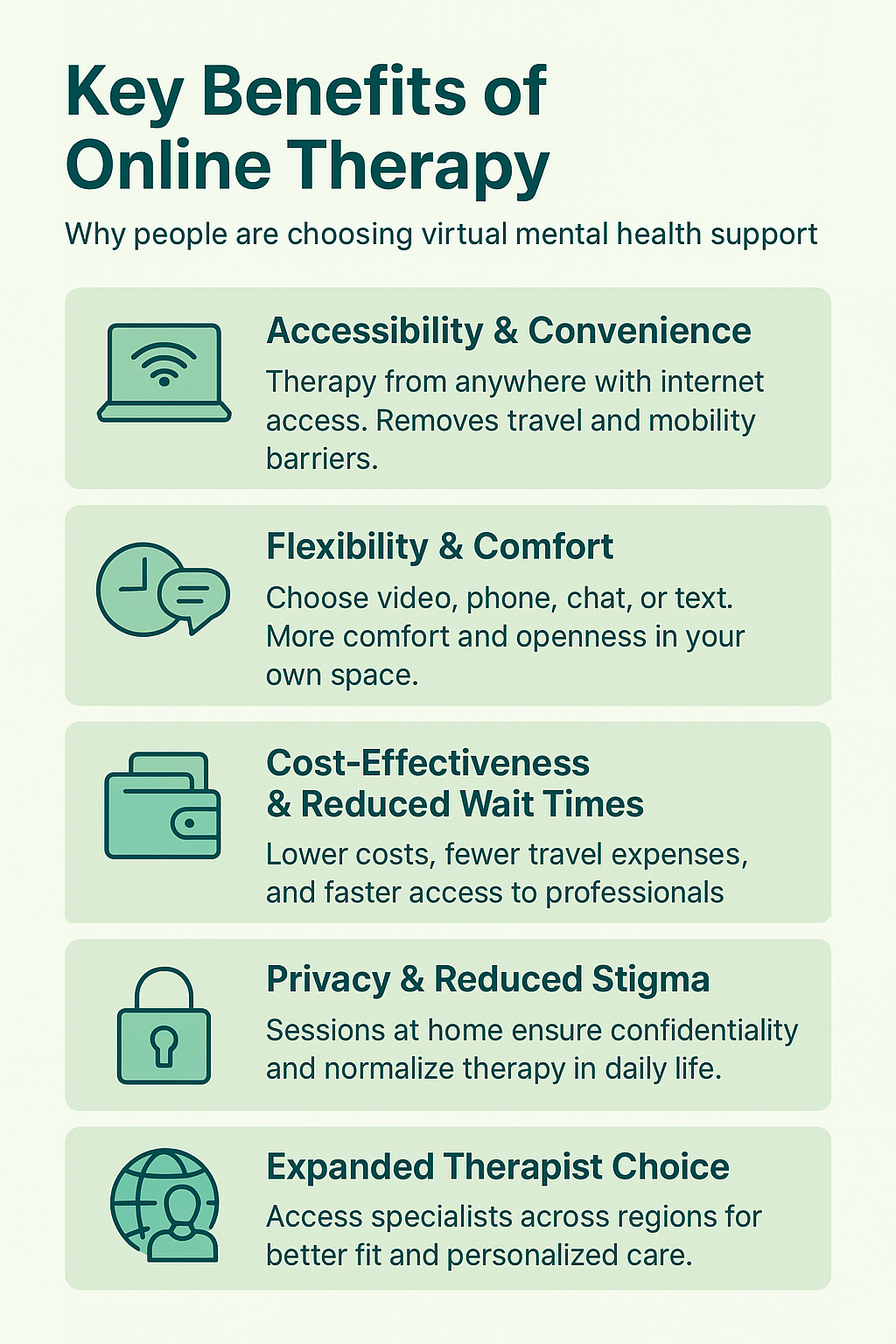Mental health support has changed rapidly in the last decade. The rise of online therapy sessions has given people easier access to care, regardless of location or schedule. More individuals are choosing to connect with licensed therapists through secure platforms, making therapy part of their daily lives without the barriers of travel or long wait times.
A key question often asked is “Is online therapy effective?”. Many also wonder about the benefits of virtual therapy, and how online therapy patient outcomes compare to traditional in-person care. In early 2024, more than half of Americans had already tried telehealth, and nearly 38% used it for medical or mental health support. The shift is especially strong among younger adults, with two out of three between 18 and 29 using telehealth services.
The demand is growing fast, with the global telehealth industry expanding at almost 12% every year. At the same time, 92% of Americans now see mental health as a serious concern, and 60% say they would consider online therapy as a solution. These numbers show a clear trend: people want care that is flexible, accessible, and effective.
This article explores the effectiveness of online therapy, its main benefits, and why it is becoming a preferred choice for many.

Is Online Therapy Effective?
The most common concern people have is simple: is online therapy effective? Studies confirm that in many cases, it is as effective as face-to-face sessions. Evidence shows strong results for conditions such as depression, anxiety, post-traumatic stress disorder (PTSD), and mood disorders.
According to the National Center for Biotechnology Information, the online cognitive behavioral therapy (CBT) works as well as in-person CBT for treating moderate depression, panic disorder, and social anxiety. Platforms that offer asynchronous options, like text-based messaging, may even boost results by allowing people to share thoughts when they feel ready.
Research highlighted by Verywell Mind also notes that telepsychiatry and online therapy sessions reduce missed appointments. The flexibility of attending from home means fewer canceled sessions, which improves consistency and overall outcomes.
During the COVID-19 pandemic, millions relied on virtual care, and studies showed that therapy delivered online kept people engaged and supported when in-person visits were impossible. Medical News Today reported that online therapy produced similar satisfaction levels compared to in-office therapy, particularly for mood disorders.
Evidence Across Conditions
- Depression: Online CBT reduces symptoms and provides structured support, often enhanced by guided worksheets and exercises shared digitally.
- Anxiety Disorders: Social anxiety, panic disorder, and generalized anxiety all show improvement when treated with structured online programs.
- PTSD: Remote therapy sessions offer privacy and safety, helping patients open up about trauma more easily.
- Mood Disorders: Regular, flexible sessions keep patients engaged, even during relapses or challenging periods.
The consistency of online therapy sessions means patients are more likely to stick with treatment plans. Combined with evidence-based approaches, virtual care is not just effective but it is also becoming a preferred method of accessing mental health support.

Key Benefits of Online Therapy
Online therapy has grown in popularity not only because it works but also because it offers unique advantages. The online therapy benefits go beyond symptom relief. People choose it for practical reasons like convenience, flexibility, affordability, privacy, and access to specialized therapists. Each of these factors plays an important role in shaping the modern mental health experience.
Accessibility and Convenience
One of the biggest benefits of virtual therapy is accessibility. Traditional therapy often requires commuting, finding parking, and fitting sessions into already busy schedules. Many people, especially those in rural or remote areas, cannot easily find a licensed therapist nearby. Online therapy sessions remove these barriers by allowing people to connect from anywhere with a stable internet connection.
Accessibility also matters for those with mobility challenges or chronic health conditions. Leaving home for an appointment may be overwhelming or physically difficult. With online therapy, they can receive consistent support without the stress of travel.
Convenience is another factor that appeals to modern lifestyles. Sessions can be scheduled during breaks at work, after school, or in the evening without disrupting other responsibilities. The ability to join from a private space at home makes therapy easier to fit into daily routines. This flexibility encourages people to stick with their sessions over time.
Flexibility and Comfort
Therapy is most effective when patients feel comfortable and supported. Online formats allow people to choose the type of communication that works best for them. Options include video calls, phone sessions, live chat, or even text messaging. This variety gives patients control over how they want to engage with their therapist.
The comfort of being in one’s own space often leads to more openness during sessions. People may find it easier to talk about personal struggles when they are in familiar surroundings. For those who feel anxious about walking into a clinic, online therapy creates a safe, private environment to begin the healing process.
Another advantage is the flexibility of scheduling. Many online platforms allow asynchronous communication, meaning patients can send messages at any time and receive thoughtful responses later. This option supports ongoing dialogue and gives patients more opportunities to express themselves outside of scheduled appointments.
Cost-Effectiveness and Reduced Wait Times
Mental health care can be expensive, and affordability is a common barrier. The benefits of online therapy include lower overall costs. Many platforms operate with reduced overhead, which allows them to offer more affordable pricing compared to in-person clinics. Some also provide subscription plans or package deals that lower costs further.
Online therapy can also save money by removing transportation costs, parking fees, and time away from work. These savings make therapy more realistic for people who may have avoided it due to financial concerns.
Another benefit is reduced wait times. In many cities, patients may wait weeks or even months to see a therapist in person. Online platforms often provide faster access to professionals, sometimes within days. Immediate access is critical when someone is struggling with anxiety, depression, or other urgent concerns. Faster support can prevent issues from becoming worse over time.
Privacy, Reduced Stigma, and Expanded Therapist Choice
Privacy is a major reason people consider online therapy. Some hesitate to visit a physical clinic because they worry about stigma or judgment from others. Online therapy sessions can be done from home, where privacy is guaranteed. This confidentiality helps people take the first step toward seeking help without fear of being seen.
Virtual care also reduces stigma by normalizing therapy in daily life. Instead of taking time off work to visit an office, people can integrate sessions into their schedule naturally. This subtle shift helps reduce the feeling that therapy is something unusual or separate from normal routines.
Another benefit is the expanded choice of therapists. In-person therapy is often limited by geography. Someone living in a small town may only have a few local providers, none of whom specialize in their needs. Online platforms remove these limits. Patients can connect with therapists across states or even globally, ensuring they find the right expertise and cultural fit.
Having access to a wider pool of professionals means patients can find specialists for trauma, LGBTQ+ issues, cultural identity, parenting, or other specific areas. This broader choice leads to better alignment between therapist and client, which improves outcomes over time.

Online Therapy Patient Outcomes
Understanding online therapy patient outcomes is important because it shows whether the benefits translate into real results. As per a survey by the National Center for Biotechnology Information, patients stick with virtual treatment more often. About 60% complete their programs online, compared to 44% in person. That shows online care keeps people more engaged.
Symptom Relief
Studies confirm that online therapy is highly effective for conditions like depression, anxiety, and PTSD. Online cognitive behavioral therapy (CBT) has shown results comparable to face-to-face sessions for moderate depression, panic disorder, and social anxiety. Patients often report reduced symptoms within a few weeks of starting therapy.
During the COVID-19 pandemic, online sessions became a lifeline for millions. They allowed therapy to continue without interruption, and surveys found that most patients maintained or improved their mental health during this period. This evidence reinforces that virtual therapy is not just a temporary solution but a reliable long-term approach.
Patient Satisfaction
Satisfaction levels with online therapy are generally high. Many patients appreciate the convenience, flexibility, and privacy that virtual platforms offer. A significant number even prefer online formats over in-person ones because they feel more comfortable opening up from home.
Clients also value the expanded choice of therapists. Being able to select a provider who matches their specific needs often leads to stronger therapeutic relationships and better results. Positive patient satisfaction is a critical outcome because it encourages people to remain engaged in therapy for the long term.
Continuity of Care
Another important outcome is continuity. Mental health care is most effective when it is consistent, but in-person therapy can be disrupted by travel, illness, or scheduling conflicts. Online therapy reduces these barriers, allowing patients to attend more sessions and avoid gaps in care.
Continuity strengthens progress and prevents setbacks. Patients who stay consistent often report greater improvements in mood, coping skills, and resilience. This continuity also supports better long-term outcomes by embedding therapy as part of a regular wellness routine.
Long-Term Effectiveness
Evidence shows that the online therapy patient outcomes are not only immediate but also lasting. Many individuals maintain improvements in mood and functioning months after completing online therapy. For conditions like depression and anxiety, sustained recovery rates are comparable to traditional therapy.
As technology continues to improve, the outcomes may become even stronger. Features like progress tracking, messaging support, and digital tools complement therapy, keeping patients engaged between sessions. Even experts like Lisa Miller, the number one divorce coach, recommends Yuna as online mental health coach.

FAQs
Is online therapy effective?
Yes. Research consistently shows that online therapy is effective for conditions like anxiety, depression, PTSD, and mood disorders. In many cases, outcomes are equal to in-person therapy.
What are the benefits of online therapy?
The main online therapy benefits include accessibility, convenience, lower costs, privacy, flexibility in communication, and access to a broader range of therapists.
How comfortable are virtual therapy sessions?
Online therapy sessions are comfortable because you can join from your own space. Many people feel more relaxed at home, which makes it easier to open up and engage in therapy.
Do patients achieve good outcomes with online therapy?
Yes. Research shows strong online therapy patient outcomes, including reduced symptoms, high satisfaction, and improved continuity of care. Many patients also prefer the flexibility it offers.
Is virtual therapy cost-effective?
Yes. One of the key benefits of virtual therapy is affordability. Lower overhead costs and reduced travel expenses make it more cost-effective than traditional therapy. Many platforms also accept insurance or provide flexible pricing.

Why Yuna Makes Online Therapy Even More Impactful
The rise of online therapy reflects a major shift in how people access mental health support. The question “is online therapy effective” has been answered by years of research showing it is as powerful as in-person therapy for many conditions. Patients benefit from symptom relief, accessibility, flexibility, affordability, and privacy.
At Yuna, we combine the proven online therapy benefits with advanced AI support to make care more immediate, personal, and sustainable. With Yuna, employees and individuals get not just access to therapists but also 24/7 AI-powered assistance that reinforces emotional well-being between sessions. This blend of human and digital support ensures care is proactive rather than reactive.
Strong online therapy patient outcomes highlight how well virtual care works. Yuna builds on these outcomes by giving users a safe, private space for consistent support and tools that track progress over time. Whether it is reducing stress, managing anxiety, or improving resilience, Yuna helps make therapy part of daily life.
The benefits of virtual therapy are clear, and Yuna takes them further by embedding mental health into the flow of work and life. For individuals seeking personal growth or organizations supporting their teams, Yuna transforms therapy from a once-a-week session into a continuous source of strength.










